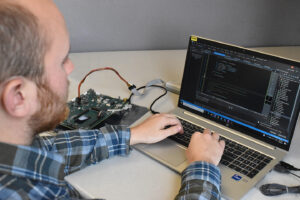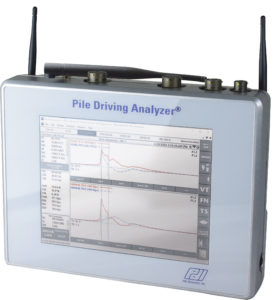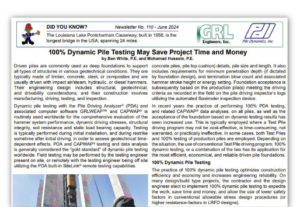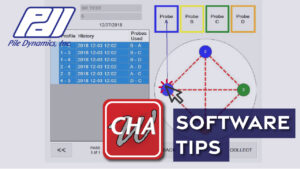Managing Risk: Thermal Integrity Profiler
With any construction project, there are many potential sources of risk. It is imperative to minimize these various risks to achieve a successful project. For cast-in-place foundations (e.g. drilled shafts, bored piles, augercast piles, CFA piles, micropiles, barrettes, etc.). These risks include:
- Time and schedule delays
- Cost
- Quality
- Safety
- Foundation performance over time

Time and Schedule Delays: Many quality control methods for cast-in-place foundations require waiting 3 to 7 days after casting before the testing can occur. These time delays negatively impact the construction schedule which increases the overall project cost. Thermal Integrity Profiler (TIP™) testing uses the heat created from the hydration process which begins immediately after the foundation is cast and continues until the peak concrete temperature is reached. The testing is completed within typically 12 – 24 hours after casting. The thermal data for each foundation element can be sent directly to the cloud where test results can be viewed immediately. With results being available so quickly after casting is complete, construction schedules can be accelerated, with real time shaft acceptance. If integrity issues are discovered, the foundation can be remediated and construction procedures corrected early on, allowing construction to continue on schedule.
Cost: There are many sources of cost uncertainties including scheduling delays due to unforeseen circumstances, as well as resolving issues with foundation quality. The testing methods used to determine foundation quality might detect a real issue that will likely cost the project due to time lost while these issues are resolved, which generally has a negative effect on the overall construction schedule. It is also possible that the quality assurance testing equipment has detected a quality issue that is either irrelevant or incorrect (examples include bleed water channels and debonding during CSL testing which will appear as defects, but are really just a limitation of the test method). These false positives can cause major delays and add significant cost to a project in the form of unnecessary coring and time delays while the apparent problems are resolved. With TIP™, these false positive issues are eliminated as these conditions have no effect on the TIP™ analysis method. This will minimize time delays and reduce the risk for cost overruns in the foundation construction. By sending data in real-time to the cloud, on-site testing costs are eliminated.
Quality: Defects in any foundation are generally unacceptable, and potentially may result in total foundation failure. TIP™ is currently the only method that evaluates the entire cross section of the foundation element. The concrete cover outside the reinforcing cage and the eccentricity of the cage are evaluated. TIP™ is also not susceptible to bleed water channels of debonding issues that plague other methods. Most other methods often rely on testing only a random percentage of foundation elements. The relatively inexpensive cost to install Thermal Wire® cables and minimal cost of reviewing TIP™ data stored in the cloud, allows all instrumented elements to be evaluated. If integrity issues are detected, construction procedures can be modified early in the project to eliminate the need of expensive remediation.
Safety: Minimizing risks is imperative to a successful project. TIP™ testing can minimize safety risk for spliced cage sections by the use of quick splice connectors done outside the reinforcing cage. Other quality control methods require splicing access tubes within the reinforcing cage. This method often requires site personnel to work with their hands and arms inside the reinforcing cage for extended periods of time, increasing the possibility for injury. TIP™ data is sent from the jobsite via the cloud to the testing engineer at a remote location, thus omitting testing personnel working from near open excavations, eliminating the risk of potential injury.
Foundation Performance Over Time: Significant quality issues during the foundation installation can lead to project delays, expensive remediation including replacement shafts, and foundation failure. Foundations installed with issues that are not detected early can lead to very expensive repair costs and potentially catastrophic failure to the superstructure, including loss of life. Serviceability of drilled foundations is dependent upon the proper long-term concrete strength, as well as the proper concrete cover to provide the needed protection for the reinforcing cage from caustic soil conditions. TIP™ technology can evaluate the concrete cover to assess whether the as-built shaft meets the design intent.




